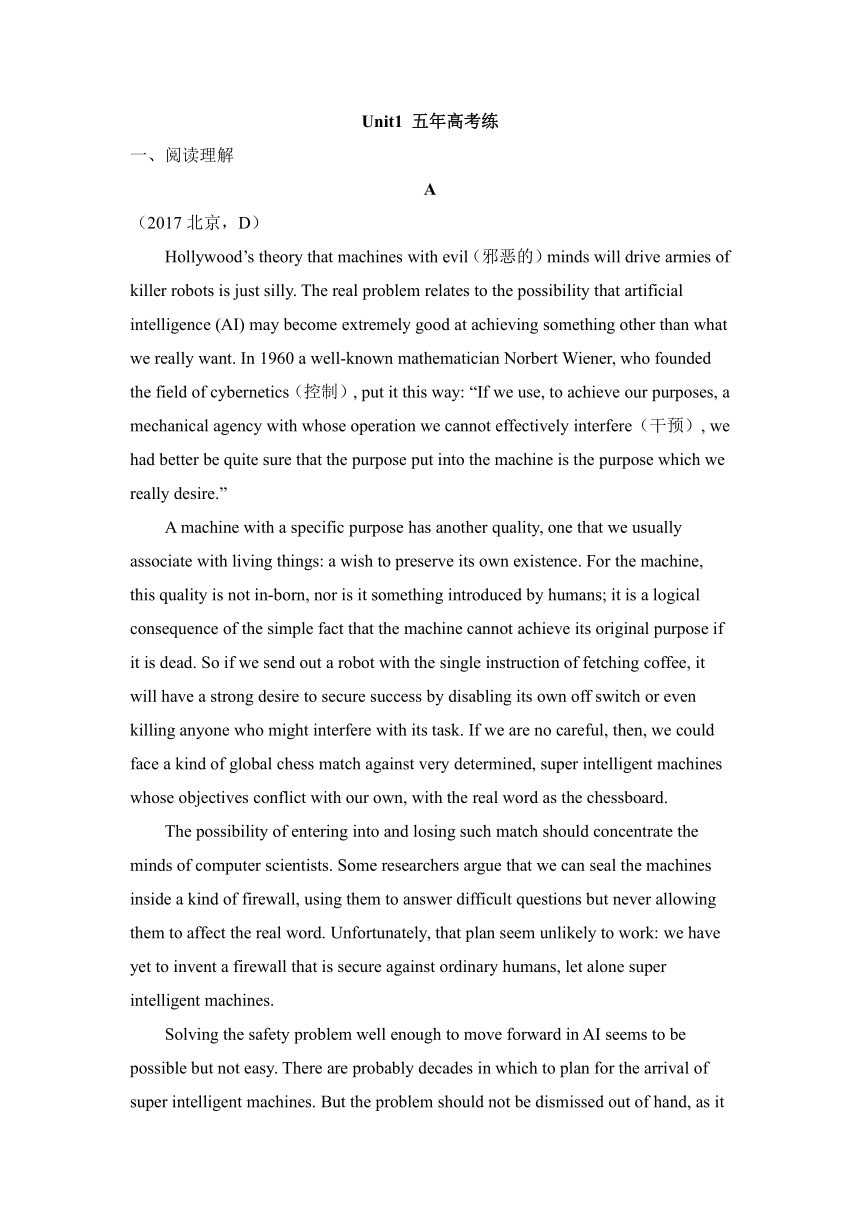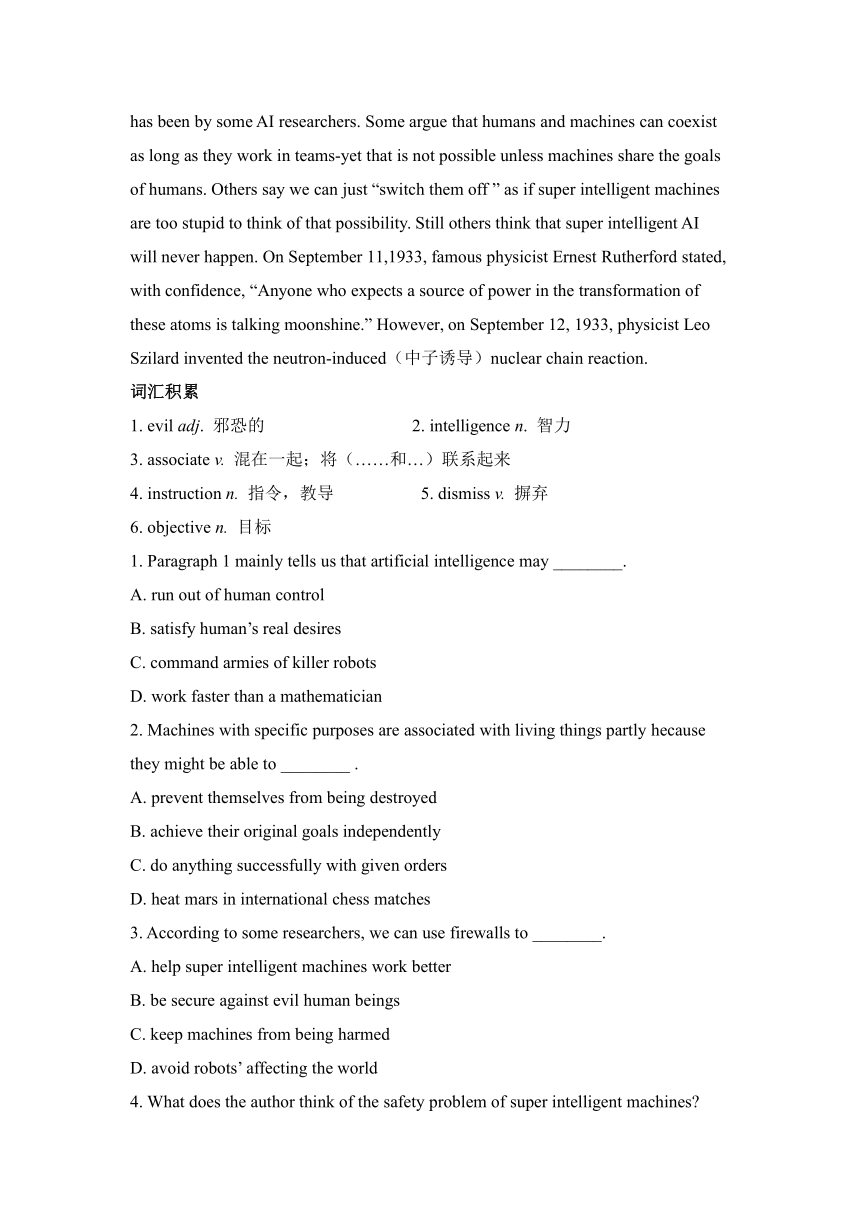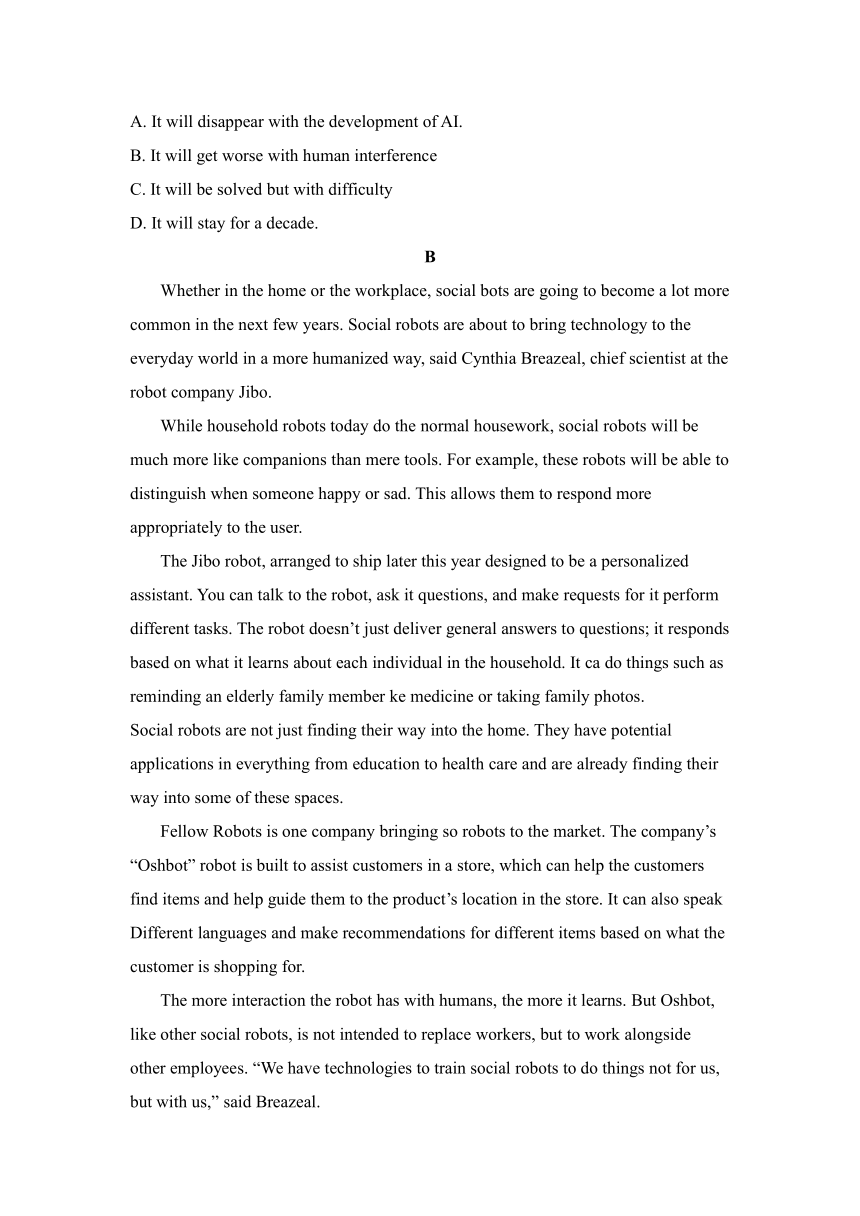人教版(2019)高中英语选择性必修第四册 Unit1Science Fiction 五年高考练(有解析)
文档属性
| 名称 | 人教版(2019)高中英语选择性必修第四册 Unit1Science Fiction 五年高考练(有解析) |

|
|
| 格式 | docx | ||
| 文件大小 | 17.6KB | ||
| 资源类型 | 教案 | ||
| 版本资源 | 人教版(2019) | ||
| 科目 | 英语 | ||
| 更新时间 | 2023-03-14 00:00:00 | ||
图片预览



文档简介
Unit1 五年高考练
一、阅读理解
A
(2017北京,D)
Hollywood’s theory that machines with evil(邪恶的)minds will drive armies of killer robots is just silly. The real problem relates to the possibility that artificial intelligence (AI) may become extremely good at achieving something other than what we really want. In 1960 a well-known mathematician Norbert Wiener, who founded the field of cybernetics(控制), put it this way: “If we use, to achieve our purposes, a mechanical agency with whose operation we cannot effectively interfere(干预), we had better be quite sure that the purpose put into the machine is the purpose which we really desire.”
A machine with a specific purpose has another quality, one that we usually associate with living things: a wish to preserve its own existence. For the machine, this quality is not in-born, nor is it something introduced by humans; it is a logical consequence of the simple fact that the machine cannot achieve its original purpose if it is dead. So if we send out a robot with the single instruction of fetching coffee, it will have a strong desire to secure success by disabling its own off switch or even killing anyone who might interfere with its task. If we are no careful, then, we could face a kind of global chess match against very determined, super intelligent machines whose objectives conflict with our own, with the real word as the chessboard.
The possibility of entering into and losing such match should concentrate the minds of computer scientists. Some researchers argue that we can seal the machines inside a kind of firewall, using them to answer difficult questions but never allowing them to affect the real word. Unfortunately, that plan seem unlikely to work: we have yet to invent a firewall that is secure against ordinary humans, let alone super intelligent machines.
Solving the safety problem well enough to move forward in AI seems to be possible but not easy. There are probably decades in which to plan for the arrival of super intelligent machines. But the problem should not be dismissed out of hand, as it has been by some AI researchers. Some argue that humans and machines can coexist as long as they work in teams-yet that is not possible unless machines share the goals of humans. Others say we can just “switch them off ” as if super intelligent machines are too stupid to think of that possibility. Still others think that super intelligent AI will never happen. On September 11,1933, famous physicist Ernest Rutherford stated, with confidence, “Anyone who expects a source of power in the transformation of these atoms is talking moonshine.” However, on September 12, 1933, physicist Leo Szilard invented the neutron-induced(中子诱导)nuclear chain reaction.
词汇积累
1. evil adj. 邪恐的 2. intelligence n. 智力
3. associate v. 混在一起;将(……和…)联系起来
4. instruction n. 指令,教导 5. dismiss v. 摒弃
6. objective n. 目标
1. Paragraph 1 mainly tells us that artificial intelligence may ________.
A. run out of human control
B. satisfy human’s real desires
C. command armies of killer robots
D. work faster than a mathematician
2. Machines with specific purposes are associated with living things partly hecause they might be able to ________ .
A. prevent themselves from being destroyed
B. achieve their original goals independently
C. do anything successfully with given orders
D. heat mars in international chess matches
3. According to some researchers, we can use firewalls to ________.
A. help super intelligent machines work better
B. be secure against evil human beings
C. keep machines from being harmed
D. avoid robots’ affecting the world
4. What does the author think of the safety problem of super intelligent machines
A. It will disappear with the development of AI.
B. It will get worse with human interference
C. It will be solved but with difficulty
D. It will stay for a decade.
B
Whether in the home or the workplace, social bots are going to become a lot more common in the next few years. Social robots are about to bring technology to the everyday world in a more humanized way, said Cynthia Breazeal, chief scientist at the robot company Jibo.
While household robots today do the normal housework, social robots will be much more like companions than mere tools. For example, these robots will be able to distinguish when someone happy or sad. This allows them to respond more appropriately to the user.
The Jibo robot, arranged to ship later this year designed to be a personalized assistant. You can talk to the robot, ask it questions, and make requests for it perform different tasks. The robot doesn’t just deliver general answers to questions; it responds based on what it learns about each individual in the household. It ca do things such as reminding an elderly family member ke medicine or taking family photos.
Social robots are not just finding their way into the home. They have potential applications in everything from education to health care and are already finding their way into some of these spaces.
Fellow Robots is one company bringing so robots to the market. The company’s “Oshbot” robot is built to assist customers in a store, which can help the customers find items and help guide them to the product’s location in the store. It can also speak
Different languages and make recommendations for different items based on what the customer is shopping for.
The more interaction the robot has with humans, the more it learns. But Oshbot, like other social robots, is not intended to replace workers, but to work alongside other employees. “We have technologies to train social robots to do things not for us, but with us,” said Breazeal.
词汇积累
1. distinguish vt.区分;辨别 2. appropriately adv.适当地;合适地
3. personalized adj.个性化的;个人化的 4.individual n.个人 5.application n. 应用;申请;应用程序 6. interaction n.交流;相互作用 7. recommendation n.推荐
5. How are social robots different from household robots
A. They can control their emotions.
B. They are more like humans.
C. They do the normal housework
D. They respond to users more slowly
6. What can a Jibo robot do according to Paragraph 3
A. Communicate with you and perform opera.
B. Answer your questions and make requests.
C. Take your family pictures and deliver milk.
D. Obey your orders and remind you to take pills.
7. What can Oshbot work as
A. A language teacher.
B. A tour guide.
C A shop assistant.
D. A private nurse.
8. We can learn from the last paragraph that social robots will .
A. train employees
B. be our workmates
C. improve technologies
D. take the place of workers
9. What does the passage mainly present
A. A new design idea of household robots.
B. Marketing strategies for social robots.
C. Information on household robots.
D. An introduction to social robots.
参考答案
A
【语篇解读】本文为议论文。人工智能如果有了某种特定的目标,它便会不择手段地去生存并去实现自己的目标。如果放任不管,人类也许会失去对人工智能的控制。解决这个问题虽然是有可能的,但并非易事
1. A【解析】主旨大意题。根据第一段可知,人工智能有可能会超出人类的控制,Norbert Wiener创立的控制论也说明了这一点。
2. A【解析】推理判断题。由第二段中的“a wish to preserve its own existence"以及“it is a logical consequence of the simple fact that the machine cannot achieve its original purpose if it is dead”可以看出,有特定目标的机器会保护自身免于毁灭,故选A。
3. D【解析】细节理解題。根据第三段中的“Some researchers argue that we can seal the machines.,using them to answer difficult questions but never allowing them to affect the real world.” AJLA得知,一些研究者认为利用防火墙可防止机器影响到现实世界。
4. C 【解析】细节理解题。由最后一段的首句“Solving the safety problem well enough to move forward in Al seems to be possible but not easy."可知,很好地解决安全问题并取得进展是有可能的,但是绝非易事,C项符合文章内容。
B
【语篇解读】本文为说明文,题材为科普知识类。过不了几年,社交类机器人就会以更加人性化的服务方式进入人们的日常生活。它们不仅是一种工具,而且会成为人们的朋友根据不同的人群提供不同的服务。
5. B【解析】推理判断题。根据第二段内容可知,如今家庭机器人可以做日常家务,但是社交类机器人则更像是人类的朋友,而不仅仅是工具。例如:这些机器人可判断人的不同心情,从而做出不同的反应。由此可推知与家庭机器人相比,这些机器人更像人类。
6. D【解析】细节理解题。根据第三段内容可知,你可以和这种机器人说话,问它问题,要求它去执行各种任务,这种机器人不仅可以给出问题的一般答案,而且还会根据不同的家庭成员作出不同的反应,如提醒老人吃药或者拍全家福等。D项中服从命令”和“提醒吃药”都是这种机器人可以胜任的。
7. C【解析】细节理解题。由倒数第二段的“…is built to assist customers in a store"可知,Oshbot可以作为售货员,帮助顾客找到他们所需要的商品,并且还能根据顾客需要提出建议。
8. B【解析】细节理解题。根据最后一段第二句可知,设计这种机器人不是用来替代工人的,而是和其他工人一起工作的,因此它们会成为我们的同事。
9. D【解析】主旨大意题。概括全文可知,本文主要介绍了社交类机器人,如为家庭提供人性化服务的 Jibo robot以及可作为售货员的 Oshbot。
一、阅读理解
A
(2017北京,D)
Hollywood’s theory that machines with evil(邪恶的)minds will drive armies of killer robots is just silly. The real problem relates to the possibility that artificial intelligence (AI) may become extremely good at achieving something other than what we really want. In 1960 a well-known mathematician Norbert Wiener, who founded the field of cybernetics(控制), put it this way: “If we use, to achieve our purposes, a mechanical agency with whose operation we cannot effectively interfere(干预), we had better be quite sure that the purpose put into the machine is the purpose which we really desire.”
A machine with a specific purpose has another quality, one that we usually associate with living things: a wish to preserve its own existence. For the machine, this quality is not in-born, nor is it something introduced by humans; it is a logical consequence of the simple fact that the machine cannot achieve its original purpose if it is dead. So if we send out a robot with the single instruction of fetching coffee, it will have a strong desire to secure success by disabling its own off switch or even killing anyone who might interfere with its task. If we are no careful, then, we could face a kind of global chess match against very determined, super intelligent machines whose objectives conflict with our own, with the real word as the chessboard.
The possibility of entering into and losing such match should concentrate the minds of computer scientists. Some researchers argue that we can seal the machines inside a kind of firewall, using them to answer difficult questions but never allowing them to affect the real word. Unfortunately, that plan seem unlikely to work: we have yet to invent a firewall that is secure against ordinary humans, let alone super intelligent machines.
Solving the safety problem well enough to move forward in AI seems to be possible but not easy. There are probably decades in which to plan for the arrival of super intelligent machines. But the problem should not be dismissed out of hand, as it has been by some AI researchers. Some argue that humans and machines can coexist as long as they work in teams-yet that is not possible unless machines share the goals of humans. Others say we can just “switch them off ” as if super intelligent machines are too stupid to think of that possibility. Still others think that super intelligent AI will never happen. On September 11,1933, famous physicist Ernest Rutherford stated, with confidence, “Anyone who expects a source of power in the transformation of these atoms is talking moonshine.” However, on September 12, 1933, physicist Leo Szilard invented the neutron-induced(中子诱导)nuclear chain reaction.
词汇积累
1. evil adj. 邪恐的 2. intelligence n. 智力
3. associate v. 混在一起;将(……和…)联系起来
4. instruction n. 指令,教导 5. dismiss v. 摒弃
6. objective n. 目标
1. Paragraph 1 mainly tells us that artificial intelligence may ________.
A. run out of human control
B. satisfy human’s real desires
C. command armies of killer robots
D. work faster than a mathematician
2. Machines with specific purposes are associated with living things partly hecause they might be able to ________ .
A. prevent themselves from being destroyed
B. achieve their original goals independently
C. do anything successfully with given orders
D. heat mars in international chess matches
3. According to some researchers, we can use firewalls to ________.
A. help super intelligent machines work better
B. be secure against evil human beings
C. keep machines from being harmed
D. avoid robots’ affecting the world
4. What does the author think of the safety problem of super intelligent machines
A. It will disappear with the development of AI.
B. It will get worse with human interference
C. It will be solved but with difficulty
D. It will stay for a decade.
B
Whether in the home or the workplace, social bots are going to become a lot more common in the next few years. Social robots are about to bring technology to the everyday world in a more humanized way, said Cynthia Breazeal, chief scientist at the robot company Jibo.
While household robots today do the normal housework, social robots will be much more like companions than mere tools. For example, these robots will be able to distinguish when someone happy or sad. This allows them to respond more appropriately to the user.
The Jibo robot, arranged to ship later this year designed to be a personalized assistant. You can talk to the robot, ask it questions, and make requests for it perform different tasks. The robot doesn’t just deliver general answers to questions; it responds based on what it learns about each individual in the household. It ca do things such as reminding an elderly family member ke medicine or taking family photos.
Social robots are not just finding their way into the home. They have potential applications in everything from education to health care and are already finding their way into some of these spaces.
Fellow Robots is one company bringing so robots to the market. The company’s “Oshbot” robot is built to assist customers in a store, which can help the customers find items and help guide them to the product’s location in the store. It can also speak
Different languages and make recommendations for different items based on what the customer is shopping for.
The more interaction the robot has with humans, the more it learns. But Oshbot, like other social robots, is not intended to replace workers, but to work alongside other employees. “We have technologies to train social robots to do things not for us, but with us,” said Breazeal.
词汇积累
1. distinguish vt.区分;辨别 2. appropriately adv.适当地;合适地
3. personalized adj.个性化的;个人化的 4.individual n.个人 5.application n. 应用;申请;应用程序 6. interaction n.交流;相互作用 7. recommendation n.推荐
5. How are social robots different from household robots
A. They can control their emotions.
B. They are more like humans.
C. They do the normal housework
D. They respond to users more slowly
6. What can a Jibo robot do according to Paragraph 3
A. Communicate with you and perform opera.
B. Answer your questions and make requests.
C. Take your family pictures and deliver milk.
D. Obey your orders and remind you to take pills.
7. What can Oshbot work as
A. A language teacher.
B. A tour guide.
C A shop assistant.
D. A private nurse.
8. We can learn from the last paragraph that social robots will .
A. train employees
B. be our workmates
C. improve technologies
D. take the place of workers
9. What does the passage mainly present
A. A new design idea of household robots.
B. Marketing strategies for social robots.
C. Information on household robots.
D. An introduction to social robots.
参考答案
A
【语篇解读】本文为议论文。人工智能如果有了某种特定的目标,它便会不择手段地去生存并去实现自己的目标。如果放任不管,人类也许会失去对人工智能的控制。解决这个问题虽然是有可能的,但并非易事
1. A【解析】主旨大意题。根据第一段可知,人工智能有可能会超出人类的控制,Norbert Wiener创立的控制论也说明了这一点。
2. A【解析】推理判断题。由第二段中的“a wish to preserve its own existence"以及“it is a logical consequence of the simple fact that the machine cannot achieve its original purpose if it is dead”可以看出,有特定目标的机器会保护自身免于毁灭,故选A。
3. D【解析】细节理解題。根据第三段中的“Some researchers argue that we can seal the machines.,using them to answer difficult questions but never allowing them to affect the real world.” AJLA得知,一些研究者认为利用防火墙可防止机器影响到现实世界。
4. C 【解析】细节理解题。由最后一段的首句“Solving the safety problem well enough to move forward in Al seems to be possible but not easy."可知,很好地解决安全问题并取得进展是有可能的,但是绝非易事,C项符合文章内容。
B
【语篇解读】本文为说明文,题材为科普知识类。过不了几年,社交类机器人就会以更加人性化的服务方式进入人们的日常生活。它们不仅是一种工具,而且会成为人们的朋友根据不同的人群提供不同的服务。
5. B【解析】推理判断题。根据第二段内容可知,如今家庭机器人可以做日常家务,但是社交类机器人则更像是人类的朋友,而不仅仅是工具。例如:这些机器人可判断人的不同心情,从而做出不同的反应。由此可推知与家庭机器人相比,这些机器人更像人类。
6. D【解析】细节理解题。根据第三段内容可知,你可以和这种机器人说话,问它问题,要求它去执行各种任务,这种机器人不仅可以给出问题的一般答案,而且还会根据不同的家庭成员作出不同的反应,如提醒老人吃药或者拍全家福等。D项中服从命令”和“提醒吃药”都是这种机器人可以胜任的。
7. C【解析】细节理解题。由倒数第二段的“…is built to assist customers in a store"可知,Oshbot可以作为售货员,帮助顾客找到他们所需要的商品,并且还能根据顾客需要提出建议。
8. B【解析】细节理解题。根据最后一段第二句可知,设计这种机器人不是用来替代工人的,而是和其他工人一起工作的,因此它们会成为我们的同事。
9. D【解析】主旨大意题。概括全文可知,本文主要介绍了社交类机器人,如为家庭提供人性化服务的 Jibo robot以及可作为售货员的 Oshbot。
